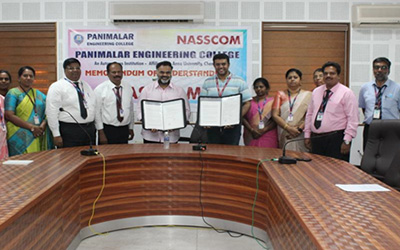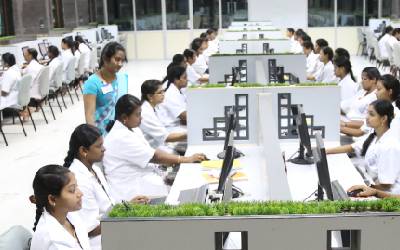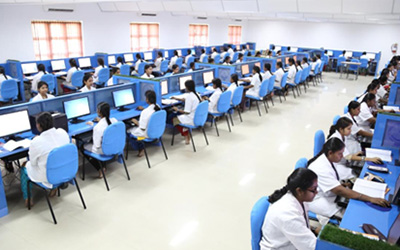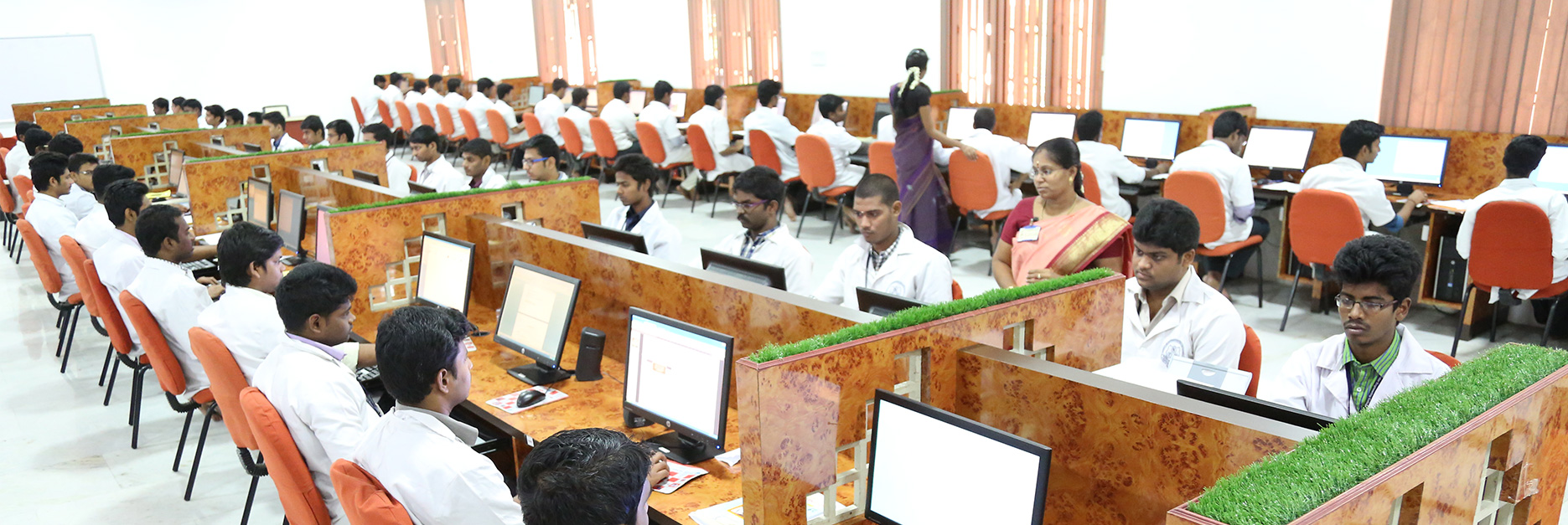
About the Department
Vision and Mission
PEO,PO’S,PSO’S
HOD Profile
Faculty List
Milestone
Professional Society
Clubs
Events
Newsletter and Magazines
Survey Forms
Question Bank
Department Library
About the Department
- The department of Artificial Intelligence and Machine Learning has been established in the year 2022, recognized by AICTE. Artificial Intelligence specialization will create engineers, who can build solutions, with intelligence as humans.
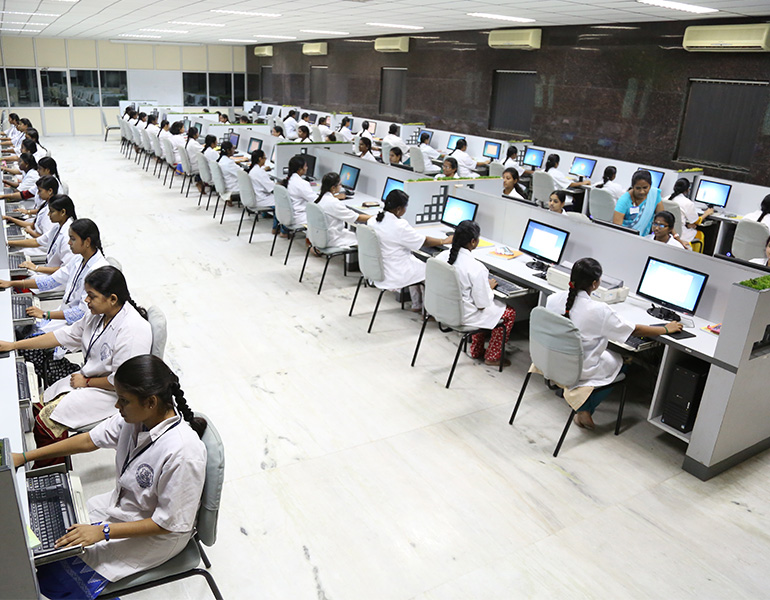
- The department conducts co-curricular activities such as Guest Lectures, Seminars, Training programs, Workshops, etc. The Department also organizes industrial visits to help students to update their knowledge.
- An exclusive Training and Placement cell is functioning for providing continuous training and placement assistance to the students during their course of study. The students are trained by internal trainers and industry experts with various training partners to improve their employability skills like soft skills, technical, analytical and logical skills. Apart from training, to enhance the innovative thinking and managerial skills of young minds, they are encouraged to organize and participate in various events like paper presentations, technical symposia and project presentations.
- Currently, the world is being driven digitally with technology and data being present everywhere. It is because many leading companies in the world today, such as Face book, Google and Uber, make machine learning as a central part of their operations. The machine learning market size has been steadily growing. It is a type of data mining that allows computers to learn on their own experience.
- Nowadays, it's not an exaggeration to say that each of us encounters machine learning multiple times daily. Until the 1960s AI and ML were more or less synonymous, but thereafter they diverged and now they are rampant in the tech industry, mass media and academia.
- Data scientists and machine-learning engineers are two of the top-ranked jobs globally. Professionals with critical expertise in the domain of data science and machine learning are highly sought after by tech and finance organizations.
- This course dives deep into the foundational as well as advanced concepts of data science and machine learning to enable students to devise practical solutions in real context.
- The department provides state-of-the-art computing facilities to the students enabling them to stay a step ahead. They are exposed to various opportunities such as in plant training, internships, and workshops during their course of study.

Vision and Mission

VISION
To be a center of excellence in the field of Artificial Intelligence and Machine Learning applications through appropriate use and diffusion of emerging techniques.
MISSION
- To develop students with strong capabilities in Artificial Intelligence by continuously enhancing teaching and learning with state-of-the-art technologies.
- To provide high-quality, value-based education to gain competence in Artificial Intelligence and Machine learning in terms of research and innovation activities.
- To implement engineering solutions for the benefit of society by the use of AI and ML.
Programme Educational Objectives(PEOs)
Programme Outcomes (POs)
Programme Specific Outcomes (PSOs)
HOD Profile

Dr.B.Anni Princy M.E, Ph.D.,
Professor and Head of the Department in Artificial Intelligence & Machine Learning
Dr. Anni Princy .B has completed 28 years of teaching Experience. She received M.E., degree in Computer Science & Engineering in the year 2004 and Ph.D. in Computer Science & Engineering in the year 2015 from Sathyabama University, Chennai; she has published 50+ articles in various reputed National and International Journals and patented 6 of her ideas. Her areas of interest include Software Reliability Engineering, Networking and Machine Learning. She received fund Rs.7,85,000/- from AICTE for MODROB . She is affiliated with the Institute of Electrical and Electronics Engineers (IEEE) & Computer Society of India (CSI).
Received Inspiring Senior Faculty Award - ADVANCED MATERIALS & APPLICATIONS (ISSN: 2582-5070) An International peer reviewed journal published by Madras Journal Series Pvt Ltd , Received “Best Teacher Award” in the year 2007-2008, Panimalar Engineering College and also received Certificate of appreciation as a proctor to guide and oversee competing teams for the IEEE Xtreme 11.0 programming competition that hosted 8,300 participants 14th October 2017
Faculty List
| S.No. | Name of the Faculty | Designation |
|
1. |
Dr.ANNI PRINCY.B | Professor |
|
2. |
Dr.SURESH .G | Professor |
|
3. |
Dr.SASIKUMAR. D | Professor |
|
4. |
Dr.KANIMOZHI.S | Associate Professor |
|
5. |
Dr.ANAND BABU.R | Associate Professor |
|
6. |
Mr.NAGARAJ.J | Assistant Professor GR-I |
|
7. |
Mr. MUTHU. V | Assistant Professor |
|
8. |
Mrs. VANIPRIYA.B | Assistant Professor |
|
9. |
Mrs.PANDI KUMARI.M.R | Assistant Professor |
|
10. |
Mrs.SARANYA . A | Assistant Professor |
|
11. |
Mrs.BHARANI .M | Assistant Professor |
|
12. |
Mr.EZHILVENDAN .M | Assistant Professor |
|
13. |
Mr.RIZWAN BASHA. A | Assistant Professor |
|
14. |
Mrs. THAMIZHARASI .K | Assistant Professor |
|
15. |
Mrs. RAMATHILAGAM A | Assistant Professor |
|
16. |
Ms.ALAMELU .R | Assistant Professor |
|
17. |
Mr.VENKATESAN .R | Assistant Professor |
|
18. |
Mr.AKASH S D | Assistant Professor |
|
19. |
Mr.RAJASEKARAN S | Assistant Professor |
|
20. |
Ms. DERISHA MAHIL | Assistant Professor |
|
21. |
Ms.MEENAKSHI L | Assistant Professor |
|
22. |
Ms.HASHINI S | Assistant Professor |
|
23. |
Mr.THIYAGARAJAN C | Assistant Professor |
|
24. |
Mrs.VENITHA E | Assistant Professor |
|
25. |
Mrs.SARANYA V | Assistant Professor |
|
26. |
Ms. ELIS LISAPIOUS A | Assistant Professor |
|
27. |
Mrs.ASWINI S | Assistant Professor |
|
28. |
Mrs.SANGEETHA.N.V | Assistant Professor |
|
29. |
Mrs.NAGASRI B | Assistant Professor |
First Year Faculty List
| S.No. | Name of the Faculty | Designation |
|
1. |
Mrs.VINODHINI.S |
Assistant Professor |
|
2. |
Mrs.RAJALAKSHMI.A |
Assistant Professor |
|
3. |
Mr.MAHADEVAN P |
Assistant Professor |
| 4. | Mr.MANIKANDAN J |
Assistant Professor |
Department Highlights
| Name of the Department | Start Year | Sanctioned Intake |
| AI & ML | 2022-23 | 60 |
| 2023-24 | Intake revised from 60 to 240 |
Survey Forms
Question Bank – Academic Year 2025-26 (Odd Semester)
| YR/SEM | SUBJECT CODE | SUBJECT TITLE | LINKS |
|
II yr/ III sem |
23MA1304 | Mathematical Foundations for Artificial Intelligence | https://sites.google.com/view/23ma1304-mfai/home |
| 23AD1302 | Artificial Intelligence and Expert Systems | https://sites.google.com/view/aiml-ii-iii-sem-23ad1302-aies/home | |
| 23AD1303 | Object Oriented Programming Paradigm | https://sites.google.com/view/23ad1303/home | |
| 23CS1301 | Digital Principles and Computer Architecture | https://sites.google.com/view/23cs1301-dpca/home | |
| 23CS1303 | Database Management Systems | https://sites.google.com/view/23cs1303-dbms/home | |
|
III yr/ V sem |
23AD1501 |
Formal Language |
|
|
23ML1501 |
Advanced Machine Learning |
||
|
23AD1503 |
Data Analytics |
https://sites.google.com/view/aiml-iiiv-sem-21ad1504-dataana/home |
|
|
23AD1504 |
Knowledge Engineering and Intelligent Systems |
https://sites.google.com/view/aiml-iii-v-sem-21ad1505-keis/home |
|
|
23CE1010 |
Open Elective-I |
https://sites.google.com/view/aiml-iiiv-sem-21ce1010-apec/home |
|
|
23IT1909 |
Ethical Hacking |
||
|
IV yr/ VII sem |
21AD1703 |
AI and Robotics (Lab Integrated) |
https://sites.google.com/view/21ad1703-ai-and-robotics/home?authuser=1 |
|
21AD1702 |
Computer Vision |
||
|
21IT1502 |
Web Technologies |
https://sites.google.com/view/regulation2021-webtechnologies/home |
|
|
21IT1903 |
Professional Elective – III |
||
|
21CS1911 |
Professional Elective – IV |
https://sites.google.com/view/panimalarengineeringcollege/home |
|
|
21ML1904 |
Professional Elective – IV |

AIML Department Library Details
| Item | Details |
| Area | 166 Sq.m. |
| No. of Volumes | 803 |
| No. of Titles | 288 |
| No. of Total Technical Journals(Scopus-National) | 15 (Access to Central Library-II) |
| No. of Reprints(International Journals) | 09 (Access to Central Library-II) |
| No. of Computers | 01 |
| No. of E-Journals | 05(IEEE-ASPP/IEEE-POP/ELSIVIER-SCOPUS/ DELNET/EBSCOHOST |
| No. of E-BookS | 01 (MGH) |

E-Resources(E-journals / E-Books)
Click Here

Remote Access Resources
Click
Here


